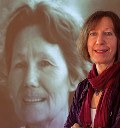
Directed by
Sophia Turkiewicz
73 minutes
Rated PG
Reviewed by
Bernard Hemingway

Once My Mother
Synopsis: A documentary charting Sydney-based film and television director, Sophia Turkiewicz’s reconciliation with her elderly mother.
Sophia Turkiewicz's nicely crafted film weaves together two journeys, one literal, the other emotional. The first deals with the remarkable story of her mother, Helen Skwarek, born in pre-WWII Poland, orphaned by the early death of her parents, thrown onto the streets by her uncle when barely in her teens, deported to Siberia by Stalin. Freed after two years she made her way through Uzbekistan then Iran and what was then Persia before being sent by the British to a refugee camp in Northern Rhodesia, where she fell pregnant to an Italian POW, finally arriving in Australia as a single mother. The second is that of the director herself as she charts her own journey, from being a child abandoned by her mother in an Adelaide orphanage and a rebellious teenager during the 1960s to being a film-maker and a mother herself, most significantly for the purposes of this film, to her own mother.
The film opens with a moving scene of Sophia visiting her mother in a nursing home. The old lady is no longer able to connect to the middle-aged woman she sees before her with the image of the daughter she has in her imagination. The plucky frailty of the one, the caring patience of the other is a marvellously effective precursor to the dual histories that are about to unfold.
Using an impressively-assembled bank of archival footage and stills including extracts from an attempt as a budding film-maker in the late1970s to document her mother’s story, Ms. Turkiewicz creates a telling visual analogue to the measured narration and Helen’s intermittent memories. The footage of men and woman working in snow-covered Siberia was something I’ve never seen and really brought home what an amazing story of survival is Helen’s.
Once My Mother is a portrait of a simple woman’s extraordinary bravery and resilience and a love that never died. In that respect it is a quietly uplifting film. If I have one criticism it is that the narration, although being in the first person and written by the director, is not spoken by her (it is credited to Jen Vuletic). This seems a strange choice as it distances her somewhat from the project, even more so because we hear her mother's own voice.
Ultimately, however, Ms.Turkiewicz has created a testament to the woman who went through so much to become her mother. In that respect what she has done is a fine thing and one which deserves your attention.
FYI: Ms.Turkiewicz told a fictionalized version of her mother's story in her 1984 debut feature, Silver City.

Want more about this film?


Want something different?




